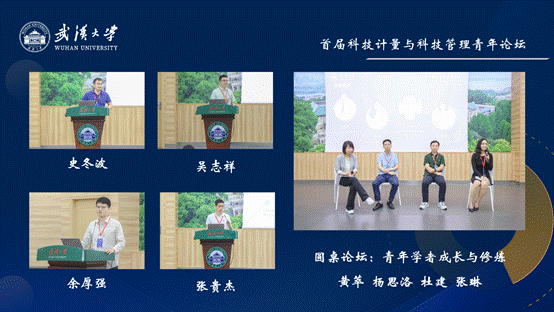On May 21, the First Youth Forum on Scientometrics and S&T Management was held in Wuhan University. The Forum was co-sponsored by the Science and Education Management and Evaluation Center of Wuhan University, Center for Studies of Information Resources, Wuhan University, Wuhan Data Intelligence Research Institute and our School. Nearly 400 experts, scholars, graduate students and undergraduates from more than 100 universities and scientific research institutions at home and abroad attended the Forum.

Lihong Zhou, Professor and Associate Dean of our School, attended the Forum and addressed. He pointed out that the Report to the 20th National Congress of the Communist Party of China proposed to "accelerate the realization of high-level scientific and technological self-reliance". To consolidate the foundation of China's scientific and technological self-reliance, we need the full cooperation of the government, colleges and universities, scholars and other parties to continuously improve China's scientific research assessment and management system. In this context, the First Youth Forum on Scientometrics and S&T Management would carry out in-depth discussions around relevant key and hot topics, pool wisdom and serve the scientific decision-making of the Party and the government. He hoped that through this Forum, academic exchanges and discussions would be strengthened, the ideas of young scholars would be broadened, the passion for theoretical innovation would be stimulated, and the prosperity and development of academic research in the fields of Scientometrics and S&T Management would be promoted.
In the thematic report session in the morning, Yi Bu, Assistant Professor at Peking University, explained the influence of science funding on researchers' performance and output from the aspects of political hegemony, isomorphism and project familiarity.
Huizhen Fu, Associate Professor at the School of Public Affairs, Zhejiang University, took the field of climate change as an example to introduce the interdisciplinary measurement method and the role of interdisciplinary scientific literature in its academic influence.
Yong Huang, Associate Professor at our School, modeled the behavior of scholars' choosing in research interest and explored the evolution of research interest topics.
Jin Mao, Associate Professor at our School, put forward a new index of subversive research based on knowledge entity recognition in his report.
Chaoguang Huo, Associate Professor at the School of Information Resource Management, Renmin University of China, explained how to use graph neural network to have link prediction of interdisciplinary topics.
Weishu Liu, Associate Professor at Zhejiang University of Finance & Economics, explained the development differences between A&HCI journals and SSCI and SCIE journals.
Jing Ma, Associate Professor at the School of Economics and Management, Xidian University, demonstrated the reliability of link prediction in technology opportunity identification with empirical research.
Zhigang Hu, Associate Professor at the Faculty of Humanities and Social Sciences, Dalian University of Technology, re-understood the issue of scientific research evaluation from the perspective of emerging recommendation system, and put forward the opportunities and challenges faced by scientific and technological evaluation methods based on recommendation system.
Ying Huang, Associate Professor at our School, presided over the thematic report session in the morning.

In the afternoon thematic report session, Dongbo Shi, Associate Professor at the School of International and Public Affairs, Shanghai Jiao Tong University, showed the role changes of Chinese scholars in international scientific research cooperation.
Zhixiang Wu, Associate Professor at Nanjing Tech University, introduced the method of predicting scholars' research interests based on machine learning and dual knowledge networks.
Houqiang Yu, Associate Professor at the School of Information Management, Sun Yat-sen University, explained the research on conference leading index for the evaluation of academic influence of research institutions;
Guijie Zhang, Associate Professor at the School of Management Science and Engineering, Shandong University of Finance and Economics, explained the impact of implementing the construction project of the first-class subjects and university of the world in China on improving the scientific research output of target universities from the perspective of journals and conference articles.
Lin Zhang, Professor at our School, presided over the thematic report session in the afternoon.

After the thematic report sessions of the Forum, the round-table forum was held.
Cui Huang, Professor at the School of Public Affairs, Zhejiang University, Siluo Yang, Professor at our School, Lin Zhang, Professor at our School, Jian Du, Associate Researcher at the National Institute of Health Data Science at Peking University, as guests of the Forum, discussed the theme of Growth and Cultivation of Young Scholars with the participants. Everyone put forward a series of suggestions for the growth of young scientific research talents.
Cui Huang, Professor at the School of Public Affairs, Zhejiang University, presided over the round-table forum.
The First Youth Forum on Scientometrics and S&T Management was supported by the International Cooperation Working Committee of the China Society for Scientific and Technical Information, the Youth Working Committee of the Chinese Association of Science of Science and S&T Policy Research, Scientometrics and Informetrics Committee of the Chinese Association of Science of Science and S&T Policy Research, Documentation, Information & Knowledge (in Chinese), Journal of Information Resources Management (in Chinese), and Data and Information Management.